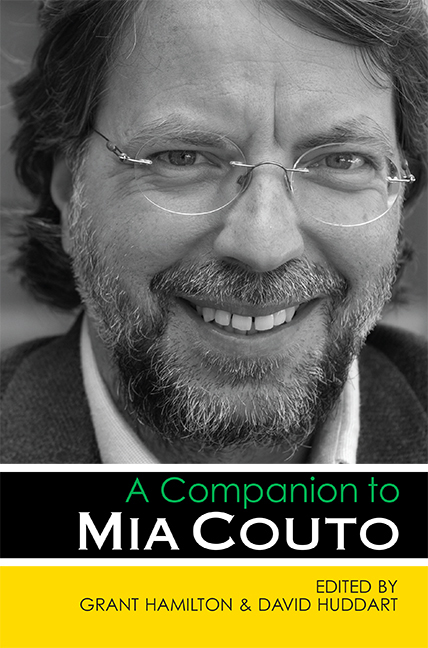Book contents
- Frontmatter
- Dedication
- Contents
- Acknowledgements
- Notes on Contributors
- Introduction
- An Interview with Mia Couto
- 1 Mia Couto in Context
- 2 Uma coisa fraterna Mia Couto & the Mutumbela Gogo Theater Group
- 3 Reading Raiz de orvalho Counterpointing Literary Genres in the Work of Mia Couto
- 4 Spaces of Magic Mia Couto’s Relational Practices
- 5 Mia Couto or the Art of Storytelling
- 6 The Multiple Worlds of Mia Couto
- 7 ‘Ask Life’ Animism & the Metaphysical Detective
- 8 Mia Couto & Translation
- 9 Jesusalém Empty Fathers & Women’s Texts
- 10 Trauma Repetition & Pure Repetition in The Tuner of Silences
- 11 Seeing Like a Crocodile Bird Mia Couto’s The Last Flight of the Flamingo
- 12 Mia Couto & Nostalgia Reading The Last Flight of the Flamingo
- 13 Mia Couto, Contexts & Issues A Bibliographic Essay
- Bibliography
- Index
6 - The Multiple Worlds of Mia Couto
Published online by Cambridge University Press: 22 May 2021
- Frontmatter
- Dedication
- Contents
- Acknowledgements
- Notes on Contributors
- Introduction
- An Interview with Mia Couto
- 1 Mia Couto in Context
- 2 Uma coisa fraterna Mia Couto & the Mutumbela Gogo Theater Group
- 3 Reading Raiz de orvalho Counterpointing Literary Genres in the Work of Mia Couto
- 4 Spaces of Magic Mia Couto’s Relational Practices
- 5 Mia Couto or the Art of Storytelling
- 6 The Multiple Worlds of Mia Couto
- 7 ‘Ask Life’ Animism & the Metaphysical Detective
- 8 Mia Couto & Translation
- 9 Jesusalém Empty Fathers & Women’s Texts
- 10 Trauma Repetition & Pure Repetition in The Tuner of Silences
- 11 Seeing Like a Crocodile Bird Mia Couto’s The Last Flight of the Flamingo
- 12 Mia Couto & Nostalgia Reading The Last Flight of the Flamingo
- 13 Mia Couto, Contexts & Issues A Bibliographic Essay
- Bibliography
- Index
Summary
Mia Couto's novels and stories, with their exuberant language and startling illumination of hidden dimensions of reality, present us with a question: ‘What is an African writer?’ The conclusive answer given by Couto is a writer who writes not just in and about Africa, who inhabits its conflicts and displacements, but who captures the spirit of the densely layered and multiplicitous reality of African life. Criticism of Mia Couto's writing seems to have revolved around two poles: the question of language, specifically whether his linguistic strategies represent the kind of transformation of the colonial language that we find in Anglophone writing, and the issue of magical realism. But it is clear that we cannot understand his work without also seeing the ways in which his imaginative world is deployed in extending the concept of Mozambican nationhood and the artist's role in reimagining the nation.
The fascination with Couto's language has been a particular obsession of Portuguese critics for whom the embattled history of Portuguese in Africa has been a continuing interest and for whom the importation of South American concepts of magical realism has seemed appropriate. For João Cosme, this concentration on language ‘constitutes a remarkable flaw since the richness of Couto's work reaches far beyond superficial language games’ (2007, 446). On the other hand, his innovative language has been condemned for portraying Mozambicans ‘speaking bad Portuguese’ (Cosme 2007, 437). Couto has always regarded himself as a short-story writer, claiming that the short story was not an inferior genre (to the novel) and, furthermore, it was the genre that best translated the orality of traditional African stories into the written word (Cosme 2007, 439). To Couto, ‘storytelling in Africa, or anywhere in the world, can help us accept, without fear, the full complexity of a world that is simultaneously based in laws and chaos, compliance and disobedience’ (Esposito 2013). Reading the episodic nature of novels such as Sleepwalking Land (2006) and Under the Frangipani (2001), we can see that his mastery of the short story extends into the novels in a way that gives them their particular character. But such stories also have a deeper function.
- Type
- Chapter
- Information
- A Companion to Mia Couto , pp. 106 - 124Publisher: Boydell & BrewerPrint publication year: 2016



